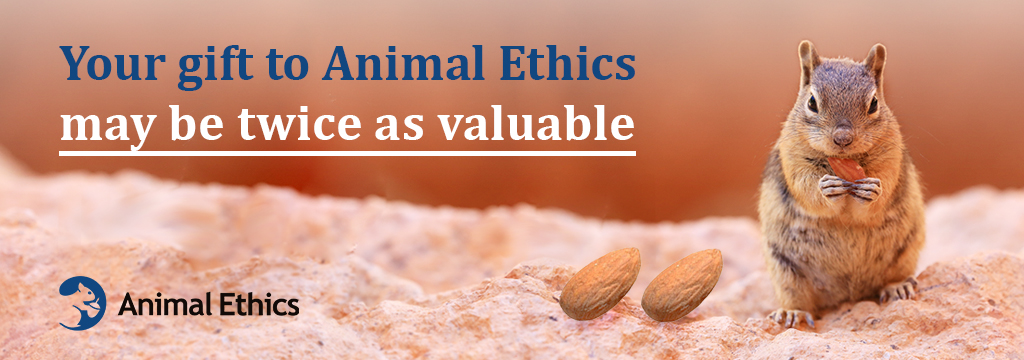Double your donations on Giving Tuesday December 1 2020

We need your support now more than ever! Giving Tuesday is coming up on December 1. If you can, please support our work so that we can continue to educate and do research to help wild animals.
Below are some highlights of our work so far this year, as well as instructions about how you can double your donation to us. You can also read a more detailed report of our work.
In 2020, we completed our most ambitious project to date, a video course about wild animal suffering that is the first of its kind. It gives detailed information about what the situation for animals in the wild is actually like, how they are currently being helped, and what we can do to help them more in the future. It also gives an overview of the ethical underpinnings of helping animals in the wild, which shows that helping them is implied by all major ethical systems. The course is accompanied by an ebook that expands on the information in the videos and provides sources for the information in the course. The videos are subtitled in English and Portuguese, and we are adding French. In addition, we created audio versions of the 28 videos. We have also released a Spanish language version of the course.
We published two studies that help identify important obstacles and opportunities in academia for wild animal welfare studies. One of the most encouraging findings is that professors and students have similar preferences and perceptions about promising areas of study, which include vaccinations, the effects of weather conditions, and the wellbeing of urban animals. This work can provide a framework for fostering academic work in this field.
As part of our commitment to helping establish university research on issues related to wild animal suffering, we funded postdoc research on a framework to aid welfare-based decision-making to help stranded whales and a study of the causes of harm to wild animals in Canada. In addition, we funded and published a study about wild animals in forest fires and how to help. The study includes a literature review of more than 400 publications about how animals are harmed by forest fires and about how they can be helped.
Some of our own work on these issues this year includes articles on the effects of the fires in Australia on wild animals and the prospects for COVID-19 vaccinations for wild animals, as well as a paper about legal consideration of wild animals in the United States.
Our international work continues to expand. We published a Hindi version of our website and launched a series of talks and webinars. In Brazil, we organized and gave two officially recognized courses about animal ethics and wild animal welfare. Animal Ethics members also gave and participated in talks and webinars in Mexico, Argentina, and several other Latin American countries.
We consider our international work crucial because information about issues like speciesism, animal sentience, and wild animal suffering is still lacking in many languages. This education and outreach is done primarily by local people who know how best to work in their part of the world. This is especially important in places where we can reach large audiences of young people, as in India, where the average age of the population is under 30.
Other outreach includes regular additions to our website and sharing on social media. Our content is available in 9 languages. We are active on Facebook, Twitter, Instagram, and YouTube. Our content is also shared on Reddit.
Our latest blog post is about the potential for learning about wild animals by eDNA sampling of hair, feathers, feces, and fish scales. To date, this has been used primarily to identify species, but it could be used to learn about the health of wild animals in a noninvasive, accurate, and cost-effective way.
Since we began our educational efforts 8 years ago, we’ve seen more people interested in the cause of wild animal suffering and, more generally, in the moral consideration of animals. We are also enabling the introduction of studies on how to reduce wild animal suffering. And in many places around the world, we are initiating the discussion of these issues among university students, animal advocates, and the general public.
In 2021, we plan to produce research papers about sentience, wild animal suffering in urban areas, vaccination programs, and applied ethics. We’ll publish research about what we can learn about the wellbeing of wild animals from data gathered at animal hospitals and sanctuaries. In addition, we will continue giving talks and webinars in English, Spanish, and Portuguese. We’ll also expand our work in India.
For more details about our work in 2020, see Animal Ethics work in 2020.
We can accomplish even more with your help. Please consider supporting our work so we can continue accomplishing the kinds of things we did in 2020!
If you donate through Facebook on Giving Tuesday on December 1, your donation may be matched by Facebook. Information about how to do this is available here. Donations on Giving Tuesday not matched by Facebook will be matched by a generous donor up to $10,000 USD.
Thank you for your continued support!